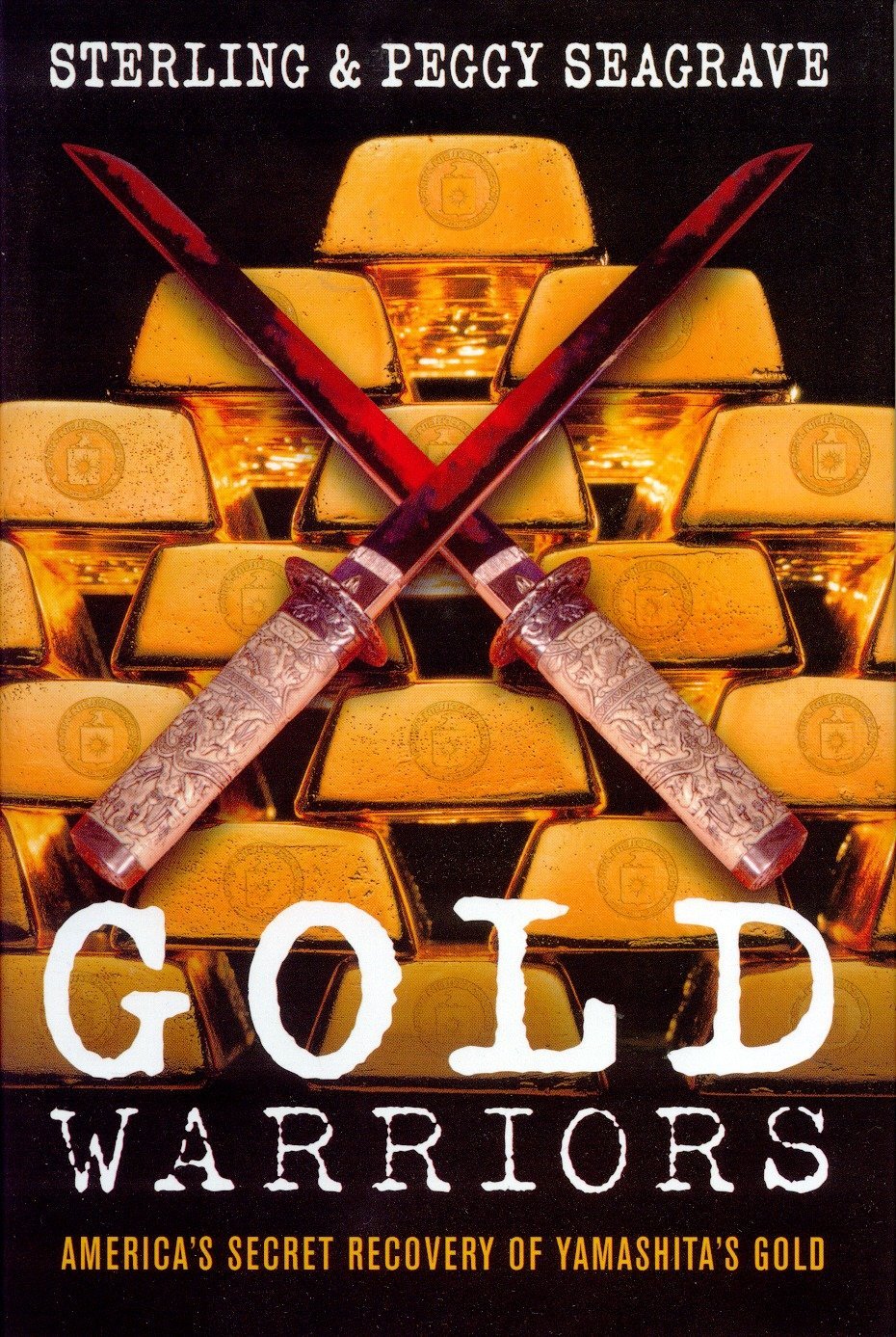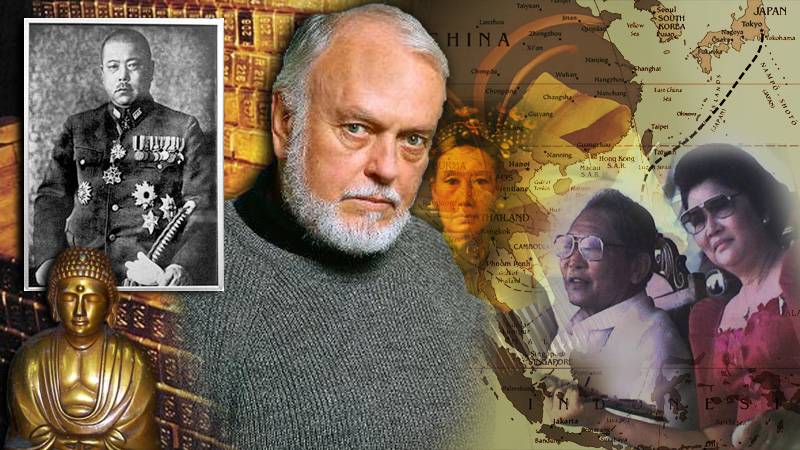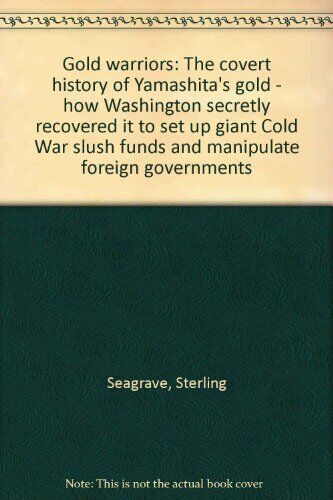Book review: Gold Warriors by Sterling and Peggy Seagrave
How did our CIA become so immensely powerful and so immensely corrupt?
This book tells a story that feels essentially relevant to me. Nevertheless, it is a story that has not been incorporated into narratives of any of the skeptical and well-informed independent journalists whom I most respect. It is 20 years old now, and the book is as exceedingly readable as it is meticulously documented.

Through wars of conquest beginning in the 19th Century, Japan systematically looted staggering quantities of gold from China, Korea, and SE Asia.
Anticipating defeat in WWII, members of the Japanese imperial family sent the Emperor’s cousin, Prince Chichibu, to bury gold and jewels at dozens of remote sites on occupied Philippine islands.
At the conclusion of the war, the driver of Chichibu’s jeep was captured and tortured to disclose the locations of some of the underground sites.
In the Seagraves’ account, the amount of gold is many hundreds of thousands of tons, equivalent in value to the GDP of the entire world today.
A portion of this loot funded the Black Eagle Trust, a secret account used to create the CIA and support its clandestine operations, fomenting wars and overthrowing popular governments around the world on behalf of the world’s largest corporations.
The M-Fund was used to kickstart “democracy” in Japan by supporting the election of war criminals and reliable anti-communists.

Another major share passed through the personal holdings of Ferdinand Marcos, an American-supported President and then dictator in the Philippines from 1965 – 1986.
Other beneficiaries included evangelist Sun Myung Moon, VP Richard Nixon, mobster Meyer Lansky, and Pope Pius XII.
In the Seagraves’ story, everyone who came in contact with this treasure was corrupted, participating in murder, treachery, and unspeakable cruelty.
My candidate for the greatest evil in the world today would be the CIA.
Whether or not you agree, you have to admit it’s a mystery how this organization acquired so much power so fast.
Formed in 1947 from the contained WWII spy operation called the Office of Strategic Services (OSS), the CIA was already overthrowing foreign governments in 1953, 1954, and 1958, and the American government in 1963.
It was the subject of warnings issued by President Truman and by President Eisenhower as he departed in 1961.
By the time President Kennedy left office, it was the CIA that escorted him out, and too abruptly for him to have a chance to warn us. He had exclaimed (after he had been deceived in the Bay of Pigs fiasco) he wanted to “splinter the CIA into a thousand pieces and scatter them into the wind.”
Who better to place in charge of the Warren Commission investigation into his murder than Allen Dulles — who had been CIA director until JFK fired him after the Bay of Pigs?
The book is meticulously referenced with two CDs full of original documents (no longer available on the Web, to the best of my knowledge).
But even more convincing is the level of narrative detail that they offer, detail that may not be relevant to the larger historical perspective, but which makes the volume fun to read, as they validate the Seagraves’ sources.
Their two best sources are Ben Valmores and Robert Curtis, both of whom they interviewed extensively.
Ben had been a Filipino boy when he was kidnapped by Japanese military officers and recruited to be valet and personal servant to Prince Takeda, cousin of the Emperor.
Though he was kept against his will, he was treated well and eventually came to be trusted by the royal family.
As the final surrender of Gen Yamashita was foreseen, Prince Takeda entrusted Ben with a trunk full of maps with coded instructions for locating all 175 treasure vaults.
Ben faithfully buried the trunks as he had been instructed, and later resisted many attempts to obtain them by trickery until after Takeda’s death in 1992.
Curtis was an American mining engineer, hired by Marcos to track down and recover Yamashita’s gold, then re-smelt it into bars that could not be chemically distinguished from the product of Filipino gold mines.
Marcos originally promised Curtis a share of the haul, but betrayed him once he had served his purpose.
Another source for the book was court records from the case of Roxas vs Marcos, Hawaii 1998.
Rogelio Roxas was a private Filipino citizen and amateur treasure hunter.

From the court findings:
In 1961, Roxas met a man named Fuchugami in Baguio City, who claimed that his father had been in the Japanese army and had drawn a map identifying the location of the legendary “Yamashita Treasure.” …Roxas organized a group of partners and laborers to search for the treasure and obtained a permit for the purpose from Judge Pio Marcos, a relative of Ferdinand. Judge Marcos informed Roxas that, in accordance with Philippine law, a thirty-percent share of any discovered treasure would have to be paid to the government.
…After approximately seven months of searching… the group broke into a system of underground tunnels…Roxas discovered a gold-colored buddha statue, which he estimated to be about three feet in height. The statue was extremely heavy; it required ten men to transport it to the surface using a chain block hoist, ropes, and rolling logs. Although he never weighed the statue, Roxas estimated its weight to be 1,000 kilograms, or one metric ton. Roxas directed his laborers to transport the statue to his home and place it in a closet.
For context, a ton of gold at today’s price is worth about $50 million, not counting the museum value of an ancient work of art.
The court document goes on to relate that Roxas’s house was raided by government agents; Roxas himself was arrested and tortured; just at this time, Marcos declared martial law and installed himself as permanent head of the Philippine government after his elected term should have expired.
The testimony of Robert Curtis is cited.
Curtis had been hired by Marcos originally to process the gold and make it saleable without suspicion.
In the end, Marcos didn’t treat Curtis much better than he treated Roxas, and that may have motivated him to testify for Roxas as plaintiff.
Five years after his death, the Hawaiian jury awarded $43 billion to the heirs of Rogelio Roxas, the largest award in the history of jurisprudence.
As the Seagrave book went to press, they were still trying to collect it in 2003.
The man who tortured Price Takeda’s driver later became a kingpin for distribution of the gold.
He was Severino Santa Romana, or “Santy”, but was known as Jose Antonio Diaz and a dozen other pseudonyms as he opened personal accounts in 42 countries around the world, with private understandings about who really had control of the gold.
He was known as an agent of the American CIA, but the Seagraves make the case that he was a double agent whose first loyalty was to the Vatican.
The involvement of the Pope was discreet and indirect.
The Vatican held deposits of Nazi gold, which were retained after the war, and received some of Santy’s accounts.
After the War, the Italian electorate was leaning too close to socialism for the taste of our CIA, and Operation Gladio was organized to steer Italian politics in a more favorable direction, using bribes, assassinations, and psy-ops.
Much of the fuel for this project was siphoned through the Vatican, which made common cause in part because religion is anathema in communist regimes, and in part for reasons of realpolitik.
Meyer Lansky profited through casinos he operated in the Bahamas, used to launder Nazi loot as well as Yamashita’s gold on behalf of the CIA.
The connection was made by Paul Helliwell, who served as global banker for the OSS and later continued in that role for the CIA.
Helliwell and Santy’s operation was code-named The Umbrella, with 176 bank accounts, all coded and accessed independently by secret agreements.
Through the 1950s, the M-Fund was administered by Americans and secretly deployed to support the right wing of Japanese politics as a bulwark against communism in Asia.
Then Vice President Nixon turned the whole $23 billion over to the (temporarily) ruling Japanese politicians in exchange for a kickback to his own 1960 presidential campaign.
Nixon didn’t succeed in 1960, but the 23 billion 1960 dollars has mushroomed in value, and the M-Fund continues to support corruption and distort democracy in Japan today.
And Sun Myung Moon?
After Marcos was removed from power in 1986, some American entrepreneurs were emboldened to return to the Philippines for treasure-hunting activities.
One group called Nippon Star was convened and equipped by right-wing groups in America, including the John Birch Society and Moon’s Unification Church.
They recovered a gold-laden freighter that the Japanese Navy had deliberately sunk in Manila Harbor when it became clear that its cargo could not be delivered to Tokyo.
The Seagraves repeat stories of individuals who recovered billion-dollar shares of Yamashita’s gold and deposited it in vaults of the world’s largest and best known banks.
One after another, they returned to reclaim their deposits, only to be told that their certificates were forgeries.
The Seagraves conjecture that banks held onto the gold and that bank executives converted the loot to their own accounts.
There may be a 9/11 connection. E.P Heidner reports (not mentioned by the Seagraves) that the Black Eagle Trust held $240 billion in U.S. Treasury notes, purchased with Yamashita gold and redeemable on 12 September 2001.
In the days following the WTC attacks, the standard procedures for recording bond transactions were suspended, and this wealth was delivered into private hands without a paper trail.
By the time Santy died in 1974, his liver and his sanity had been destroyed by alcohol.
He had never lived lavishly, despite the vast wealth under his control.
His many identities and reliably subservient behavior make me think of the CIA’s MKUltra program of mind control, a speculation that is my own and not mentioned in the Seagraves’ account.
In the Bretton Woods Agreement of 1944, why was the US able to set up a system of world trade based on a gold-backed dollar (at a fixed $35 per oz)?
Why was Japan absolved of making reparation payments to foreigners who were raped and tortured and enslaved during the War, while Germany, in much worse shape financially, was expected to pay reparations?
Why was the OSS — which had been created explicitly to provide intelligence for the Second World War — expanded and extravagantly funded after the war had ended?
How did large banks come to wield corrupt and surreptitious power in world affairs?
All these questions may have a single answer.
The most important story (as we’ve come to expect) is the one we know least about.
Some ginormous, unimaginable quantity of gold was used to kickstart the CIA.
Money for bribes and dirty tricks and “wet work” and the temptation of officials, domestic and foreign, who might otherwise be inclined toward honesty.
Money to overthrow duly elected leaders and support ruthless dictators in lavish style.
This year, the son of Ferdinand Marcos returned to power in the Philippines.
My suspicion is that the American Empire with its worldwide promotion of international business interests above all else is built on Yamashita’s gold.
We have grown up as a nation respected for our free institutions and our ability to maintain a free and open society…The last thing we needed was for the CIA to be seized upon as something akin to a subverting influence in the affairs of other people…It is being interpreted as a symbol of sinister and mysterious foreign intrigue.
— Harry S Truman, in a Washington Post Editorial published 59 years ago today

Featured image is from Amazon
Republished by The 21st Century
The views expressed in this article are solely those of the author and do not necessarily reflect the opinions of 21cir.com.
